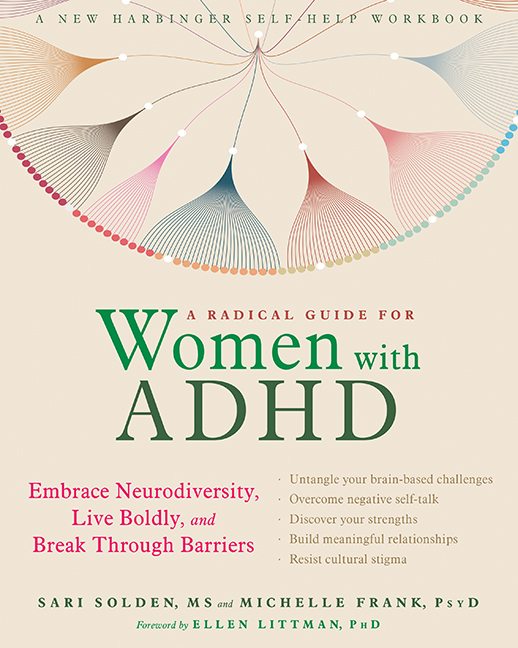By Michelle Frank, PsyD, coauthor of A Radical Guide for Women with ADHD
One of the first lines in our new book, A Radical Guide for Women with ADHD, makes a bold claim: “Instead of trying to fix yourself, you can learn to be yourself.” I’ve noticed an interesting pattern in how people respond to this idea.
Every time Sari or I say something to this effect in our talks, about one third of the room lights up with nods of relief and validation, another third registers a look of fear and uncertainty, and the final group tends to gloss over with confusion. At least one person inevitably asks, “Right, that’s nice and all, but I really DO have challenges. Just being myself doesn’t help me when my ADHD symptoms get in the way of my work, my passions, my finances, and my relationships.” And you know what? That person is onto something.
The person who speaks up is picking up on the complexity of what acceptance of life with ADHD really means. They are wondering how to navigate the gray area between acceptance and change, between self-love and self-improvement, between authenticity and self-protection. They are wondering how to have a foot in each of those spaces. They have probably tried just about everything to not have ADHD, and here they are…still themselves after all these years.
People with ADHD often say they have relied on self-criticism and the ever-moving carrot of self-improvement to stay the course when their brains won’t show up for them. They have been told, both explicitly and implicitly, to “try harder,” “fix this problem,” “be more like everyone else,” and otherwise meet neurotypical standards of living and working with a neurodivergent brain. Years of these messages can lead to deeply internalized shame and send even the most extroverted into hiding as they try to keep their differences from being too noticeable.
Understandably, then, the idea of self-acceptance is loaded with fears of losing a grip on dreams, letting people down, and handing the steering wheel over to their challenges, unchecked. For many, the word “acceptance” connotes a kind of surrender, a complacency, or even carelessness.
While understandable, we have found in our work that this fear and chronic pursuit of a fix can completely sabotage the best-laid plans to manage ADHD challenges in a healthy way. It’s hard to stick to a new self-care routine, for instance, if you berate yourself so much that you don’t believe in your own worth. And what good is a perfect time management system if you don’t like yourself at the end of the day?
We encourage you to consider what might happen if you decided to work with yourself, rather than trying to “fix” yourself. Change simply can’t happen without acceptance and self-compassion. We can’t grow in authentic ways when we keep trying to be someone else. This has nothing to do with liking our hardships or allowing our challenges to become our destiny. Nor does it mean you must view ADHD as a gift, or a curse for that matter. It simply means respecting what’s happening. In fact, the word “acceptance” means, “to take what is offered.” So, acceptance isn’t about giving up and giving in; rather, it’s standing our ground to witness what is before us and then saying, “Okay. This is what it is being offered.” You can’t give ADHD back (trust me, many have tried!). You can’t refuse the offer. You can decide what to do with it.
Keep in mind, learning to be yourself in an authentic, compassionate, responsible, and mature way takes WORK. It’s harder, not easier. It’s active, not passive. Acceptance of your challenges does not relieve you of the responsibility to do what you reasonably you can, when you reasonably can, to live with intention and truth. Living with a compassionate growth mind-set is the opposite of trying to “fix” yourself.
So, when Sari and I say, “You can be yourself, as a person with ADHD,” we mean that you can stop fighting with yourself.
You can stop spending so much energy trying to fit into boxes not made for you, and allowing other people to dictate the limits of your life.
You can choose to see yourself as a whole person, with worth, value, and various roles and qualities, instead of the sum of your challenges.
You can treat yourself with compassion AND strive for growth.
You can open up more, isolate less, and share your voice and talents with the world, even though you have differences. Because those differences are going to be there whether you participate in life or hide away from it.
When you let yourself settle into the totality of who you are, when you stop trying to find a replacement for yourself, when you push back against the familiar tangles of shame, you will find that managing your challenges becomes much more simple. And life becomes much fuller.
Michelle Frank, PsyD, is a well-regarded clinical psychologist who specializes in the diagnosis, treatment, education, and empowerment of individuals with attention deficit/hyperactivity disorder (ADHD). She draws from cognitive behavioral therapy (CBT), mindfulness-based practices, and psychoeducational approaches based in the latest research to help individuals with ADHD to live fulfilling, empowered lives. Frank serves on the board of the Attention Deficit Disorder Association (ADDA), the only nonprofit organization solely dedicated to helping adults with ADHD. She speaks nationally on issues related to ADHD, neurodiversity, and women’s empowerment.



 2024 Peace Playbook: 3 Tactics to Avoid Clashes with Your Partner
2024 Peace Playbook: 3 Tactics to Avoid Clashes with Your Partner